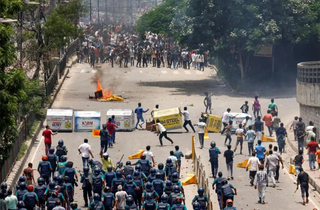Police sources confirmed a death toll of 39 on Friday, with most fatalities occurring in the capital, Dhaka. Many more have been injured in the ongoing violence.
The protests erupted this week in response to the 56% quota system, which reserves a significant portion of public sector jobs for disadvantaged groups. The government attempted to quell the unrest by closing educational institutions nationwide. However, students remain defiant and have refused to leave their campuses.
A major point of contention is the allocation of 30% of the quota to descendants of those who fought in Bangladesh's 1971 war of liberation.
Further hindering communication and transparency, the country is experiencing a near-total information blackout. Both broadband and mobile internet access are restricted, and social media platforms are inaccessible.
The ruling Awami League party attempted to negotiate with the students, proposing a reduction of the quota to 20%. This proposal was reportedly rejected by student groups.
The violence has disrupted daily life in Dhaka, with businesses partially shut down. Protesters further escalated tensions on Thursday by setting fire to the state-run television station building.
In an effort to address the situation, the government has announced the formation of a judicial commission to investigate the deaths that occurred during the protests. (ILKHA)



 Dünya
Dünya
 Güncel
Güncel
 Dünya
Dünya
 Güncel
Güncel
 Güncel
Güncel
 Güncel
Güncel
 Güncel
Güncel
 Dünya
Dünya
 Güncel
Güncel
 Röportaj
Röportaj





